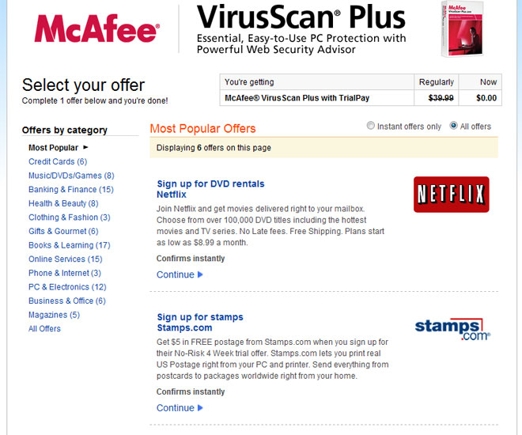A payment and promotion platform originally built to boost conversion rates for merchants selling downloadable software may also help all types of online retailers increase sales.
If your typical affiliate marketing program had a hip big brother, his name would be TrialPay. Aimed at customers who are less likely to convert, TrialPay rewards shoppers with discounts or free products from your site in exchange for completing or accepting offers from other companies.
Boiled down to its essence, TrialPay places ads for other goods and services on your ecommerce site—a concept with which not every merchant will be comfortable. But for taking a unique approach to converting customers who would have otherwise clicked the “back” button and done their shopping elsewhere, I am awarding TrialPay three and a half out of a possible five stars in this “The PeC Review.”
“The PeC Review” is my weekly attempt to introduce you to the products or services I believe can help you improve your ecommerce business, and this week, I think you should consider trying TrialPay.
The TrialPay Alternative Payment Model
When Chris Lacey, a TrialPay business development manager who works mostly with gaming sites, spoke to me about TrialPay, he started by describing the company’s origins as a means to convert customers who had downloaded the trial version of a software product, but who had not actually made a purchase.
In the downloadable software market, consumers are often able to download a free trial version of the software and use it for a month. But according to Lacey, only about 1 percent of those customers actually come back and buy the software product at the end of the trial period.
Enter TrialPay. TrialPay offers consumers a trade. In exchange for completing some offer from another merchant or vendor, the consumer can get the software they tried out for free. For example, instead of buying the software directly, I can take a trial from The Wall Street Journal; sign up for FreeCreditReport.com’s service; or apply for a new credit card; and the software is mine free of charge. On the backend, TrialPay pays the software merchant every time a customer completes an offer.

TrialPay on McAfee Site
A Real World Example: McAfee
Imagine that I am looking for antivirus software for my computer. I navigate to the McAfee website and end up on a page that encourages me to try out McAfee’s Virus Scan Plus software. When I click the “Try Now” button, I am presented with an offer. I can download the trial version or I can get the full version of the software free for one year—a $39.99 value—just for accepting an offer from Sony, Blockbuster, Netflix, Discover Card, or other brand-name consumer product or service companies.
If I click on those offers, I am taken to a McAfee-branded page on the TrialPay server, where I can pick from a list of products or services. If I decide not to take an offer, I can still make a purchase or download the trial software from McAfee.

TrialPay Offers on McAfee-branded Page
Using TrialPay At Your Ecommerce Company
Software aside, I believe there are at least three ways merchants can use TrialPay to boost sales for just about any kind of products from toys to tools.
The key to remember is that a merchant gets paid when a customer accepts a TrialPay offer. So in the McAfee example, if a customer signs up for Netflix and gets their antivirus software for free, TrialPay sends McAfee a predetermined payment—probably close to the software’s $39.99 retail price. So McAfee still gets paid for its software and the customer gets the software as part of a package or bundle with Netflix.
Stopping Shopping Cart Abandonment
TrialPay offers merchants a free cart abandonment widget in the form of a few lines of JavaScript code that you can insert in your shopping cart. When shoppers abandon a cart by clicking the browser’s back button or otherwise navigating away from the site, they are offered the option to (1) get the products in the cart for free or (2) get some set discount—say $20 off the cart’s total—in exchange for accepting one of several TrialPay offers. Thus, a merchant might close a sale that otherwise would not have happened. TrialPay will pay the merchant a bounty to offset the cost of the offer, so the merchant presumably gives up nothing if the shopper accepts the offer.
Encourage Repeat Sales
TrialPay might also help encourage repeat customers. Every good online merchant sends his or her customers an order confirmation email as part of the normal course of business. So why not encourage your new customers to become repeat customers using a TrialPay offer? At the bottom of the order confirmation, you could offer these customers a $10 off coupon on their next order for completing a TrialPay offer. In some cases, TrialPay will actually pay you more than the $10, and your customer now has an incentive to return to your site.
Make Your Own TrialPay Offers
Finally, as a merchant, I can use TrialPay to advertise my products. If I sell gift baskets, I can register as an advertiser, and if accepted, TrialPay will serve up my offer (i.e., buy a gift basket) alongside, say, Netflix, FTD flowers, and The Wall Street Journal. If someone buys my gift basket, I pay TrialPay. TrialPay then pays the merchant that served up the offer and keeps a percentage for itself.
Summing Up

TrialPay gives ecommerce businesses new ways to encourage customers to buy and new ways to monetize those customers who might not have otherwise purchased. It can benefit a merchant in two ways. On one side, you can offer customers discounts in exchange for accepting offers. On the other side, you can distribute your product offers across thousands of other websites at a predetermined cost per action.
TrialPay will even provide you with a series of best practices and marketing ideas as well as provide free creative services for developing landing pages and email campaigns.
Some merchants are not going to want to present their customers with offers from other companies, no matter how much they get paid. But others might find TrialPay to be a good way to boost conversions by 2 to 4 percent, which is why I awarded it three and a half out of a possible five stars in this review.




